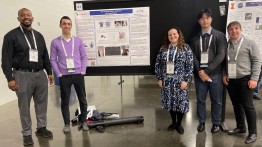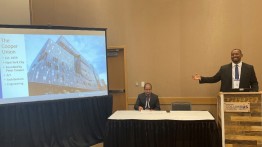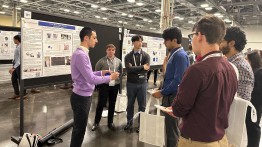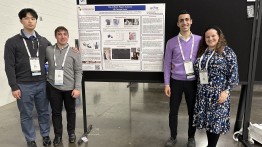Mechanical Engineering Students and Prof. Kamau Wright Presented at ASME 2022 IMECE
POSTED ON: December 1, 2022
In early November, Cooper mechanical engineering students Evan Kluger ME’24, Michelle Katz ME’24, KangHyuk Lee ME’24, Benjamin Meiner ME’24, and Kamau Wright, assistant professor of mechanical engineering, presented research at the American Society of Mechanical Engineers (ASME) 2022 International Mechanical Engineering Congress & Exposition (IMECE) in Columbus, Ohio.
IMECE is ASME's largest research and development conference focused primarily on mechanical engineering, but encompasses perspectives from many engineering disciplines. IMECE is a place for students to present their technical research and expertise, while learning from and connecting with thousands of peer researchers at a global level.
The students collaborated and presented their research on “The AI Rock Paper Scissors 3D Printed Hand” advised by Jennifer Weiser, assistant professor of chemical engineering, and Mili Shah, C.V. Starr Distinguished Professor of Engineering and Chair of Mathematics. You can view their research poster here.
Professor Wright presented in the Engineering Education Technical session on Fluid Mechanics, Aerospace, Thermodynamics, Heat Transfer, and Energy Systems. The paper presented was a collaborative effort led by Professor Wright, with co-authors consisting of mechanical engineering faculty David Wootton, George Sidebotham, and Melody Baglione;, as well as mechanical engineering students Reid Chambers ME’23, Jason He ME’24, Zachary Potoskie ME’23, and Lionel Gilliar-Schoenenberger ME’23.
Professor Wright presented on the Collaborative Learning Environment Fostered in the Engineering Experimentation course (ME 360) at The Cooper Union, highlighting one of the student-designed experiments that was facilitated based on a hydrostatic vacuum tube (HVT) system. The effort supported students in functioning effectively on teams; and demonstrating an ability to develop and conduct appropriate experimentation in line with ABET Student Outcomes.
ABSTRACT
An experimentation course in the mechanical engineering program at The Cooper Union in New York, is designed to foster a collaborative learning environment. Like many undergraduate engineering laboratory-based courses, students are tasked with working in groups to conduct and design experiments and prepare detailed technical reports and presentations. This experimentation course has two sections and two instructors facilitating collaboration at the faculty level as well. Not only do these two instructors work together, but projects in the course have “clients” and “advisors/mentors” allowing for further collaboration with other faculty and in some cases other students involved in adjacent projects at the college. This study describes the nature of the course, collaboration, and the assessment of student teamwork using the Comprehensive Assessment for Team-Member Effectiveness (CATME) tool. A case study is detailed for one student-designed experiment, using a hydrostatic vacuum tube (HVT) apparatus and associated instrumentation. The collaborative environment and emphasis on experimentation have (1) supported students in functioning effectively on teams; and (2) facilitated students in demonstrating an ability to develop and conduct appropriate experimentation in line with ABET Student Outcomes. These positive impacts can be built upon by exposing students to other strategic experimentation.
“The ASME conference was an incredible experience. It was very powerful to present the project that my group and I have been working on to a group of professionals who were there to offer encouragement and feedback. Conversations I had at the conference solidified my desire to pursue a career in assistive technology and exposed me to areas of the field that I didn't know existed.” – Michelle Katz ME’24
“The IMECE was a very unique experience that I was fortunate to attend thanks to Cooper Union. I really enjoyed presenting our hard work and hearing from so many professionals about our project and absorbing all the feedback that they had to offer.” – Benjamin Meiner ME’24
“ASME IMECE was back in person for 2022 and Columbus, Ohio was a nice location for the conference! It was great to connect with other professors and mechanical engineers about interesting developments in research, integration of research into the classroom environment, the pedagogical approaches that facilitate this integration and the associated positive impacts on the learning environments. I look forward to continuing to facilitate collaborative learning that promotes and leverages effective teamwork to accomplish the goals of new projects in engineering and engineering classrooms. It has been great working with fellow faculty and our students at Cooper to capture some of this in our collaborative paper. It was also fun to briefly connect with students at their AI poster presentation as part of the ASME International Undergraduate Research and Design Exposition. Although their project was totally separate from mine, I remember some time ago when they were collecting data for the AI project. It was nice to see it come full circle at the convention.” - Dr. Kamau Wright








